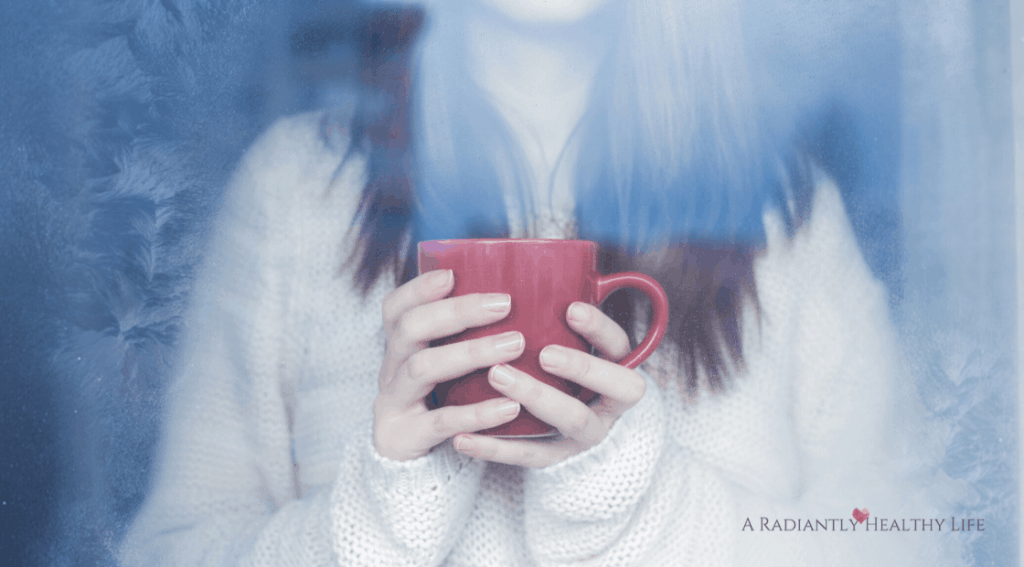Fall is winding down and winter is all but upon us, and if you live in the north like I do, the grey skies during the day and early sunset in the evening is already starting to take a toll.
Now, don’t get me wrong, I don’t mind a little snow around Christmas time, it just makes everything so beautiful, but up here in the Frozen Tundra (NE Wisconsin), winters are looooong!
I don’t know about you but I feel a huge difference in my mood, energy levels, and overall wellness on days that are sunny.
When we go through many days of no real sun I start to feel slow, cold, my mood changes, and I can even feel more anxious or depressed.
If you feel like the winter days are long and you notice your mood and a general feeling of wellbeing changing, you could be experiencing either the winter blues or Seasonal Affective Disorder.
Listen to this blog post!
Winter Blues Or Seasonal Affective Disorder?
The terms “winter blues” and “Seasonal Affective Disorder” are often used interchangeably, and while they do share common symptoms, they are not exactly the same.
Let me explain 😉
What Are Winter Blues?
It is not uncommon to feel a little slower in the winter or find yourself longing for the days of summer and sun, you may even feel a little gloomy.
You may not feel as energetic and you could find yourself snuggling in earlier than you would in the spring or summer, but you still find enjoyment in life and generally feel well.
This would be considered winter blues.
If your symptoms are more severe or begin to hinder your ability to enjoy life, you are getting into Seasonal Affective Disorder territory.
What Is Seasonal Affective Disorder?
Seasonal Affective Disorder, or SAD for short, is a very common type of depression that typically begins in the fall and can last until spring.
Symptoms of SAD may start out similar to winter blues but often become more severe and affect everyday life.
Common Symptoms of Seasonal Affective Disorder
- Sleep difficulties
- Feeling less social
- Mood fluctuations
- Loss of interest in activities
- Withdrawing from friends and family
- Feelings of hopelessness
- Suicidal thoughts
The exact cause of SAD is unknown and is probably a combination of things, which may be different for each person.
But here are some suspected causes of Seasonal Affective Disorder.
Suspected Causes Of SAD
- Changing of the seasons
- Lack of sunlight
- Less Vitamin D
- Stress
- Gender (woman experience SAD more often than men)
- Disruption in circadian rhythm
- Changes in melatonin levels
It is also believed that if you deal with negative thinking, excessive stress, or depression already, you will be more likely to experience Seasonal Affective Disorder.
Don’t lose hope though, if you find yourself feeling the winter blues or dealing with SAD, there are easy ways to help yourself that really work!
This post may contain affiliate links, which means I’ll receive a commission if you purchase through my links, at no extra cost to you. Please read full disclosure for more information.
Natural Remedies For Winter Blues And Depression
Whether you feel a little blue or downright depressed during the winter months, these natural remedies are safe, effective, and are sure to enhance your health and wellness.
Light Therapy
During the dark days of winter, it is important to take any chance you can to get outside and soak up some sun.
The natural light will help boost serotonin production and lift your mood.
If you’re interested in outdoor activities that would be perfect for enjoying a little nature and getting some fresh air and sunshine, here are 10 fun winter activities to consider!
If you’re not a fan of the outdoors in winter, or you find yourself going to work and coming home when it’s dark, consider a sun lamp.
These happy lights, as they’re called, are perfect for adding natural spectrum light that can help improve mood, sleep, and reset your circadian rhythm. Around 30 minutes in the morning is all you typically need to see real benefits!
Vitamin D
If you deal with winter blues or SAD it is very important to have your Vitamin D levels checked.
For those of us who live in the northern hemisphere, it is very common to have low Vitamin D levels which have been linked to symptoms of depression.
If you find that you are low in Vitamin D and getting out in the sun is not an option there are great ways to supplement.
- Cod Liver Oil– this traditional remedy is packed with goodness! Vitamins A, D, and a full spectrum of omega fatty acids make this a well-rounded, healthy supplement choice.
- Vitamin D Cream– not interested in cod liver oil liquid or capsules? This Vitamin D cream may be just what you’re looking for! It can be applied to the skin and your body absorbs the vitamins.
- Liquid Vitamin D – This liquid vitamin also has K-2, supports healthy bones and immunity, and is easily absorbable.
Eat Well And Exercise
I know all too well that making healthy meals and finding the energy to exercise is not easy (and can feel totally impossible!) when you are dealing with the winter blues or in a deep depression.
But if you have any extra energy, use it on this!!
What we eat and how we move our bodies have a direct effect on our brain health and mood.
If you are feeling down or depressed and begin to eat less than healthy convenience foods, you are only going to add to the problem.
Here are two tricks to eating as healthy as possible when you have low mood, depression, or anxiety–
- Order Groceries Online- many stores offer this and it is wonderful! Whether you have young kids and dread taking them in the store, have limited time, or can’t deal with all of the people because of stress, depression, or anxiety, ordering groceries and picking them up is a Godsend!! Some stores even deliver 😉
- Batch Cooking– make all of your food for the week in one day. This is not only convenient and cost-effective, but it can also really help in those times when you feel like it takes every ounce of energy just to get through your day. By doing this you will have healthy food ready and will be less likely to reach for unhealthy convenience foods.
As far as exercise, do your best. You may not feel like it, but putting on your favorite music and going for a 10-minute walk outside (or inside) really will help get the blood flowing, the mind working in a positive way, and lift your mood.
If you’re not feeling like walking, a nice easy yoga routine can really help to relax, reset, and stretch your body.
Reframe Your Thoughts
Our bodies are guided by cycles. This can be seen in the immune system, hormones, and even individual cells.
In fact, because of these cycles, it is not uncommon for people to feel slower, experience hormone changes, a circadian rhythm shift, and even have thyroid function slow in the winter.
But our modern life doesn’t typically allow for this natural slowing down, which is when problems sometimes arise. Winter is a time of year with a typically slower pace, yet we continue to push forward at full speed and do not accept this natural rhythm.
Since our thoughts and perspective play such a large role in our feelings and even our health, we need to acknowledge this rhythm and work with it as best we can instead of against it.
Try thinking of this slower time as a chance to rest and recharge instead of something to just get through.
Are you wondering how to do that? Here are a few ideas 😉
- Celebrate winter and enjoy it as a season of slowness and rest
- Make your living space warm and inviting
- Enjoy the warm glow of candles or a salt lamp in the evening
- Take time to read books that have been on your list
- Get comfy and cozy with your favorite hot tea or other favorite drink
- Invite friends or family over for dinner and games
- Disconnect from your phone or computer and go to bed early
Looking at winter as a wonderful chance to enjoy different activities and focusing on the positive aspects instead of the negative will help encourage enjoyment in life.
Get Help
If you find yourself experiencing symptoms of the winter blues or Seasonal Affective Disorder and feel that it is hindering your everyday life, it may be time to find help.
Please remember that there is absolutely no shame in reaching out!
Mental health is just as important as physical help, so if you feel yourself struggling don’t wait until things go from bad to worse. The earlier you find help the better!
I know it isn’t easy, but by taking that step you will be able to talk with someone who has a different view of you than a close friend or family member and can give insight into different skills and techniques that could be really helpful 🙂
There are even licensed professionals available online! No more trying to fit in an appointment across town or need to find a babysitter, now you can see a therapist in the comfort of your own home or on your lunch break.
There are many companies, but one that I have heard good reviews of is Betterhelp.com. They offer options like live sessions, and phone sessions, and many counselors will even text you.
Have The Best Winter Yet!
Feeling down or having depression is most likely due to a combination of factors, and while it’s not always possible to change all of them, there is a lot you can do.
Spending time outside in the sun (or using a sun lamp), eating well, adding movement to each day, working to reframe thoughts, and embracing the natural rhythms of life are huge steps toward a winter with less depression.
If you find yourself dealing with the winter blues or Seasonal Affective Disorder, start implementing changes now!
This may just be your best winter yet! 😉
How do you deal with the winter blues or Seasonal Affective Disorder?
If you have any healthy tips please feel free to share them in the comments!
Related Articles
- Light Therapy To Banish Seasonal Affective Disorder
- Common Causes Of Anxiety And Depression That Are Often Overlooked
- 18 Natural Insomnia Remedies (+ Helpful Sleep Tips!)
- 10+ Effective Supplements For Natural Holiday Stress Relief



Great article. I had NO idea that thyroid function could slow in the winter. I’ve been researching Vitamin D, as well. Makes perfect sense that supplementation during the cold winter months could be important. Thanks for the great food for thought.
Hi Hope,
I didn’t know the thyroid could be so affected by the seasons either until recently. Our bodies are so interesting! So glad you found the info helpful:)
These are all fabulous tips. I always struggle with Seasonal Depression (SAD) and this is the first year I think I’ve finally beat it! Exercise and vitamin D have certainly helped.
Krissy, I’m so glad to hear that you have found some things to help you beat SAD! I hope you keep feeling well and enjoy a wonderful winter season!
This was really helpful! These are some really fun activities to keep warm in the winter.
Glad you liked it, Grace! 🙂